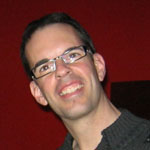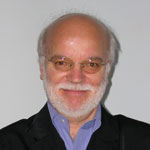How to Become a Knowledgeable Amateur by Brigitte Des Rosiers
/ September 5, 2014
Version française...
Can a non-specialist enjoy music more by developing a better understanding of it? Such is the mission of three passionate pedagogues who aim to popularize music: Michel Veilleux, Guy Marchand and François Filiatrault.
Michel Veilleux
 Opera lover and lecturer at Belles Soirées and Opéramania, Michel Veilleux is convinced that the average music lover with a bit of curiosity can learn a lot. Trained in art history, narratology and music (he did his master’s thesis on Mahler), he tackles musical analysis of works with his audiences. Opera lover and lecturer at Belles Soirées and Opéramania, Michel Veilleux is convinced that the average music lover with a bit of curiosity can learn a lot. Trained in art history, narratology and music (he did his master’s thesis on Mahler), he tackles musical analysis of works with his audiences.
The challenge? “You have to understand that some people have very little musical training, while others are very advanced,” he answers. The rule is to avoid terms that are too technical while offering reference points.
He tries to direct his public’s attention to the general structure of works. “From the moment you become aware of this structure, anything is possible,” he explains. “When you understand how a sonata is organized, you can go into detail and talk about themes, exposition, development, and summary.” It’s easy to see that a composer often plays with forms and makes them evolve, thus showing his genius and audacity. Veilleux’s most ardent desire is to give people the tools to listen critically to pieces and develop their taste.
Guy Marchand
 This is also what motivates musicologist Guy Marchand, who has facilitated the musical awakening of music lovers for over 25 years. An accomplished musician, he first studied the lute with Paul O’Dette in the USA and Nigel North in England. He then wrote a doctoral thesis and a book on the golden ratio in the works of Bach. He collaborates with Les Belles Soirées, Opéramania, and Radio-Canada, as well as giving lectures for various associations and writing liner notes and booklets for CDs. This is also what motivates musicologist Guy Marchand, who has facilitated the musical awakening of music lovers for over 25 years. An accomplished musician, he first studied the lute with Paul O’Dette in the USA and Nigel North in England. He then wrote a doctoral thesis and a book on the golden ratio in the works of Bach. He collaborates with Les Belles Soirées, Opéramania, and Radio-Canada, as well as giving lectures for various associations and writing liner notes and booklets for CDs.
He gives classes offered by the University of Sherbrooke’s École de musique aimed at non-specialists. This does not stop him from making highly advanced formal analyses of the works studied. The important thing is to have the right tools, including the method he has perfected during his years of lecturing have proved themselves.
The method involves listening to works, accompanied by graphic elements that allow the listener to reference elements of the structure. No notes or staves, but a set of signs, lines, arrows, drawings, curves, letters, and numbers allows students to recognize the melodic movements and principal themes as well as their repetitions and modifications. And it works!
Marchand swears by new technology, especially the internet, which facilitates his work. YouTube gives access to the best performances of the classical repertoire and allows everyone to access the same version. The BAnQ (Bibliothèque et Archives nationales du Québec) has amazing resources available free to everyone, and Marchand is constantly sending his students to take advantage of them, be they Medici.tv or the Oxford Music Online encyclopedia. All these resources allow him to use course notes filled with hyperlinks to please the listener and encourage more autonomy. He was rewarded when, discussing Wagner’s leitmotifs, he was told, “Not only did we recognize them, we saw them coming!”
François Filiatrault
A specialist of early music, from the  Renaissance to Classicism, François Filiatrault is largely self-taught, but one need only glance at his bookcase to understand the depth of his scholarship. He collaborated with Radio-Canada’s cultural channel for 30 years as a commentator and editor, and he regularly writes texts for the presentation of concerts and CD liner notes. Above all, he hosts lectures for general audiences for various organizations. Renaissance to Classicism, François Filiatrault is largely self-taught, but one need only glance at his bookcase to understand the depth of his scholarship. He collaborated with Radio-Canada’s cultural channel for 30 years as a commentator and editor, and he regularly writes texts for the presentation of concerts and CD liner notes. Above all, he hosts lectures for general audiences for various organizations.
How does he inform people while keeping them enthralled? “I’ve always loved sharing the things that excite me,” says Filiatrault, who has taught psychology at CÉGEP for 35 years. “I love to communicate, I love this music, and I love showing the value it has, explaining it and linking it to history and art history.”
Filiatrault, who was the musical commissioner of the 2013 exposition Splendore a Venezia, has made his mark at the Montreal Museum of Fine Arts, where he gives idiosyncratic lectures, at times related to the expositions there. He likes to talk about music by pairing musical works to pertinent works of art. His topics include the progressive development of various genres and forms, esthetical aims, and national influences and styles, among others.
In his opinion, it is possible for general audiences to grasp scholarly concepts if they are articulated clearly and simply: “You have to have confidence in people’s intelligence and curiosity.” And he is convinced that “knowledge increases pleasure, and pleasure increases knowledge.” It’s a fact that neither of his colleagues would dispute.
Upcoming Classes and Lectures (in French):
Michel Veilleux: Nabucco de Verdi at Opéramania, Friday nights starting Aug 29 at the Université de Montréal, repeated Tuesday and Thursday afternoons at U de M’s Longueuil campus; classes on the most famous oratorios and song cycles at the Longueuil campus of the Université de Sherbrooke.
François Filiatrault: Musique pour quelques portraits masculins du MBAM, Tues Apr 7, 2015, at 5:30 pm and L’univers musical d’Antoine Watteau, Sun May 24, 2015, at 2 pm, Montreal Fine Arts Museum; Initiation aux musiques de la Renaissance et du baroque, Wed Oct 1 at the Palais Montcalm, Quebec City; Initiation à la musique classique Sun Apr 12, 2015, at 2:30 pm, at the Chapelle Historique du Bon-Pasteur.
Guy Marchand: lecture on the Cantates de Bach for the Belles Soirées with the Fondation Arte Musica, Montreal Museum of Fine Arts, Maxwell Cummings auditorium, Sep 9; Le classicisme Haydn et Mozart, class for the general public given at the Longueil campus of the Université de Sherbrooke, Wednesdays Sep 3 to Dec 18; Vivaldi: les orphelines de La Pièta et les Quatre Saisons, Sep 19; Monteverdi : Saint-Marc de Venise et Les Vêpres à la Vierge Marie, Apr 17 at the Orford Arts Centre as part of U Sherbrooke’s “Université du troisième age.”
Translation: Rebecca Anne Clark
Version française... | |

